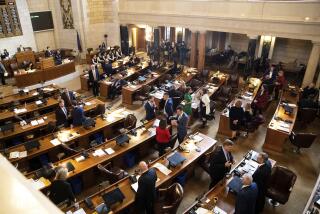In Nebraska, Dueling Candidates Strap on Lie Detectors : Politics: A congressman and his challenger each take polygraph tests after disputed ad airs. Both say they were vindicated.
- Share via
OMAHA, Neb. — Candidates are often accused of lying, but not many get around to taking lie-detector tests.
In Nebraska, two congressional candidates agreed to be strapped to a polygraph machine in a high-tech political showdown over whether the GOP candidate said public schools were teaching immoral values.
Democratic Rep. Peter Hoagland, who is seeking a fourth House term, and Republican challenger Jon Christensen each passed the tests. Of course, they were asked different questions.
Christensen passed a test administered by an independent polygraph examiner hired by the Omaha World-Herald.
“I am the only person in America running for Congress who is a certified honest individual,” Christensen said with a wide grin the other day.
The tests followed a feud over a Hoagland television commercial, which portrayed Christensen as a religious-right extremist critical of public schools.
In the commercial, an Omaha schoolteacher says Christensen came to her home and told her that public school books in Omaha teach immoral values.
Christensen denied chatting with the woman, Barbara Lebedz, or campaigning in her neighborhood. He said he believes education is a local issue.
Christensen called Hoagland a “manipulative liar.”
The dispute snowballed after Lebedz was asked whether she would submit to a lie-detector test. She said she would if Christensen would. He said he would if Hoagland would.
Christensen took the test first, on Aug. 20.
Two days later, Hoagland took a test administered by a private investigator hired by Hoagland. Hoagland stood behind Lebedz’s account, and said his test showed he did not concoct the story.
Lebedz never took the test. A polygraph examiner hired by Hoagland told her she was too emotional to undergo the exam at the time.
She attempted to take the test days after reporting to police that her family had received two death threats in phone calls about the commercial. The Hoagland campaign pulled the ads, citing the calls. Omaha police are investigating the calls.
Christensen and Hoagland are in a tight battle to represent the Omaha-area district.
Although he passed his test, Hoagland remains skeptical about the machine’s power.
“From the beginning, I have thought it makes no sense to have the credibility in this particular instance to be determined by a lie-detector machine,” he said.
So why did he take it?
“I felt it would be helpful to take it; I knew I was telling the truth,” he said. “If it would satisfy some people, then it was worth it.”
Polygraph results are inadmissible in Nebraska’s courtrooms. Critics say it is a subjective test that hinges on the examiner’s skills.
Some studies say the test is 75% accurate, while others say it is 80% or 90% accurate, said Gaylon Kuchel, a criminal justice professor at the University of Nebraska at Omaha.
It is rare for politicians to submit to such tests, but there were a few instances when candidates volunteered to take the test in the 1980s, said Henry Kenski, associate professor of communication with the department of political science at the University of Arizona in Tucson.
“I think a lie detector is kind of extreme myself,” said Kenski, co-author of the 1990 book “Attack Politics.”
More to Read
Get the L.A. Times Politics newsletter
Deeply reported insights into legislation, politics and policy from Sacramento, Washington and beyond. In your inbox twice per week.
You may occasionally receive promotional content from the Los Angeles Times.










